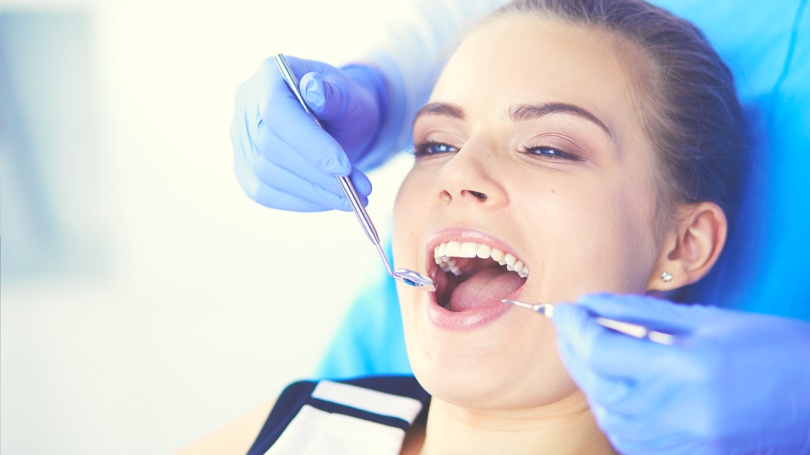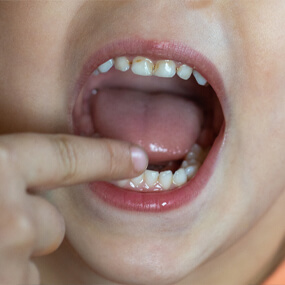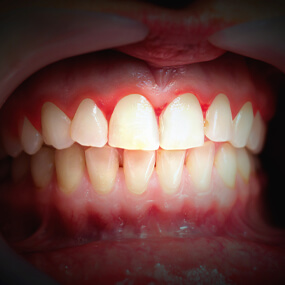Eliminate Bacterial Plaque to Avoid Gum Disease and Cavities

Bacteria require dark, wet environments that are rich with sugars and starches for them to feed on, which means that the human mouth is often an ideal setting for bacterial colonies. Oral bacteria are not necessarily bad. In fact, some bacteria are quite helpful for predigestion and your immune system. But bacteria also result in dental plaque, which can erode your enamel and infect your gums.
Dental Plaque
Bacteria interacts with your saliva and food particles in your mouth to create bacterial plaque. This plaque accumulates on your teeth and other oral surfaces and creates a biofilm, which is a community of bacteria. This biofilm creates acids that attack your tooth enamel, and when it accumulates near the gumline, it irritates your gums. According to the National Institutes of Health, plaque formation can occur as soon as 20 minutes after eating a meal, enjoying a snack, or drinking a beverage.
Dental Calculus and Periodontal Disease
The acids that compromise tooth enamel and lead to more serious tooth decay can also infect your gums and, eventually, the bones that support your teeth and gums. When plaque is left undisturbed, it can harden into dental calculus—also called tartar. Tartar cannot be removed at home through brushing and flossing, and it ensures an environment in which bacteria can thrive and produce more acids.
Infected gums will become inflamed. This inflammation is periodontal disease, which is often called gum disease. The earliest stage of gum disease is gingivitis, which is characterized by gums that are red and swollen and may bleed easily, such as when brushing. Plaque near the gumline will eventually spread below the gums and release toxins that attack bone and connective tissues. This more advanced stage of gum disease is periodontitis. It is not reversible and, left unmanaged, can result in tooth loss.
Tooth Enamel and Its Susceptibility to Acids
Enamel is the hardest tissue in the human body, but it is susceptible to acid. The weaker the enamel, the more susceptible it is, and so, you have to take care to keep it strong. The American Dental Association recommends fluoride toothpaste because it regenerates and strengthens enamel, and the ADA also recommends getting a fluoride treatment during your regular dental checkup.
Brushing Your Teeth
Be mindful that your oral health is often defined by your oral hygiene on your worst day rather than your best. It does not take long at all for bacterial plaque to accumulate and harden into calculus. Therefore, the ADA recommends brushing once in the morning after breakfast and again at night before you go to bed. Use a soft-bristled brush and fluoride toothpaste with the ADA Seal of Acceptance. Brush for at least two minutes at a time but not more than three minutes. Ensure that each tooth is brushed completely, and pay particular attention to plaque that can build up along the gumline.
Flossing
You should also floss your teeth and gums each time your brush in order to clear food particles and plaque from between the teeth and just below the gumline. This is imperative in order to ensure that tartar does not build up in those areas that are hard to clean. If you find conventional floss difficult to use, there are alternatives, such as floss holders, floss picks, water flossers, and interdental brushes.
Professional Cleanings
No matter how well you brush and floss your teeth, you likely will miss some plaque. A regular cleaning is an opportunity to remove that plaque and ensure that there is no tartar present. This cleaning often coincides with your regular checkup so that your dentist can examine your teeth and gums. Fluoride treatments are common, and your dentist may make recommendations concerning your oral hygiene.
Diet
A well-balanced diet is important for your overall health but also for your oral health. You should ensure that nutrients important to your teeth and gums are well-represented: calcium, vitamin D, potassium, phosphorous, vitamin K, vitamin C, and vitamin A. Stay hydrated. Sip water throughout your day. Limit your intake of sugars and starches. When you eat acidic foods, try to balance the meal out with cheeses and the like. Opt for healthy snacks, and avoid acidic beverages and treats.
Maintain a Plaque-Free Smile
It is essential to your oral health to avoid the accumulation of bacterial plaque. That starts at home by brushing and flossing your teeth twice a day without fail. You also need to schedule a checkup twice a year so that an oral hygienist can clean your teeth and Jeffrey D. Clark, DDS, can examine them. People who embrace this routine can keep their teeth throughout their lives and never have to deal with gum disease and cavities. Call Scottsdale Cosmetic Dentistry Excellence at 480 585 1853 to make an appointment.




